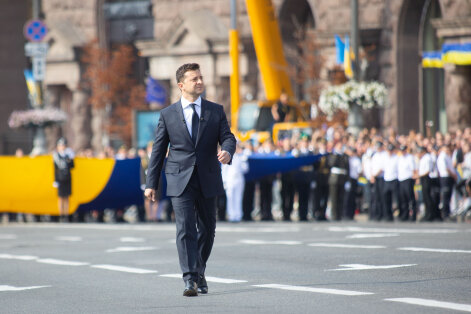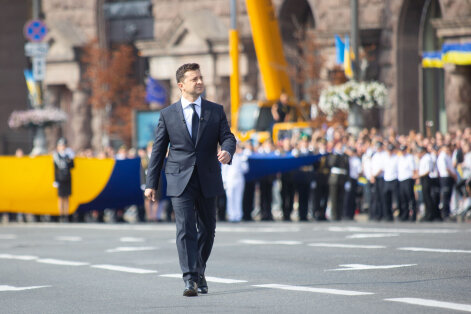by Yuriy Romanenko

The Verkhovna Rada, in their second reading, adopted bill No. 5599 “On the Prevention of Threats to National Security Associated with The Excessive Influence of Persons with Significant Economic or Political Weight in Public Life (Oligarchs).” The people call this law “the law on oligarchs”.
In this law, the authorities gain the right to designate a particular person as an “oligarch” based on four criteria.
These criteria define the oligarch as a person with the following characteristics:
1) participates in political life,
2) has a significant impact on the media,
3) is the ultimate beneficial owner (controller) of a business entity which—on the day this law will be enforced—is a subject of natural monopolies, occupies a monopoly (dominant) position in the national commodity market and maintains, or strengthens this position for one year in a row,
4) “the confirmed value of the assets of the person (and the persons whose beneficiary it is) exceeds $80 million.”
This figure raised legitimate questions since not only the top five oligarchs, but also dozens—if not hundreds—of successful businessmen and women in Ukraine possess such wealth.
The National Security and Defense Council of Ukraine (NSDC) has been instructed to “appoint” oligarchs in accordance with the new law which will—on the basis of the filings of the Cabinet of Ministers, a member of the NSDC, the National Bank of Ukraine (NBU), the Supreme Court of Ukraine (SCU) or the Anti-Monopoly Committee of Ukraine (AMC) as the “sovereign’s hand”—ensure that:
“…persons included in the registry of oligarchs will be deprived of the opportunity to make contributions in the form of their own financial resources to political parties, the electoral funds of candidates (except for their own electoral fund), political parties during the electoral process, buy large privatized objects, sponsor any political agitation, or conduct meetings and demonstrations with political slogans. The oligarch included in the register is obliged to submit a declaration as one authorized to perform the functions of the state or local government.”
Most of the formulations contained in the law will not fail in gaining support in a society that consistently rejoices when the rich are defeated by the government. However, in this situation, we cannot help but ask the question: “What will happen next?” The concentration of the “power vertical” (a term political scientists often use to refer to Vladimir Putin’s brand of post-Soviet authoritarian governance) in the hands of one party, the seemingly normal disregard for legal procedures, and the continued adherence to unconstitutional decisions cannot but lead to significant changes in the life of the country. Of course, it would be great if this would happen for a good purpose, or at least with good intentions, so that we might no longer have the poor. However, taking into consideration the agenda that’s been set by the current government, it seems as though everything is being done so that we would no longer have the rich, instead.
Let’s remember what led to this current state of affairs.
Since February 2021, the NSDC has become the key authority of President Volodymyr Zelenskyy, which has ensured the development and adoption of decisions on sanctions against Ukrainian citizens, foreigners and companies affiliated with them. At the same time, the NSDC goes beyond the existing legal field, since sanctions against Ukrainian citizens can legally be implemented in connection with specific situations. For example, in connection with activities related to the occupied territories of the Donetsk People’s Republic (DPR) and Luhansk People’s Republic (LPR). The law on sanctions was adopted during the presidency of Petro Poroshenko. It allows you to impose sanctions against the citizens of Ukraine if they are subjects that carry out terrorist activities, or belong to the circle of subjects that pose threats to national interests, national security, contribute to terrorist activities, and the like. The blocking of assets, such as a temporary restriction of a person’s right to use and dispose of his property, was used against such persons.
In the winter of 2020-2021, Zelenskyy’s team faced the problem of a drop in the rating of the president and his Servant of the People party. At the same time, Zelenskyy understood that the influence in the parliament and the government of the oligarchs did not allow him to solve the problem in the existing legal field.
Therefore, the idea was born to use sanctions to intimidate the oligarchs, the bureaucracy and the regional elite and as well as provide the president a viable instrument to increase his decreasing level of power. This move by Zelenskyy worked, as his rating grew, and the elites saw a threat in the NSDC sanctions for their business. At the same time, it cannot be said that the NSDC sanctions allowed for the solving of the systemic problems of the Ukrainian state—for example with reduced corruption and/or smuggling. No, they caused a redistribution of smuggling flows between those smugglers who are close to power and those who did not want to “share.” That is, they were situational moves.
All the punitive and functional power of the NSDC was demonstrated by the example of a strike against the pro-Russian oligarch and politician Viktor Medvedchuk, which Zelenskyy inflicted primarily because it was Medvedchuk who (using his channels) launched the harshest criticism of the president and his team in the second half of 2020. Therefore, the process of overflow of votes from the Servant of the People party to Medvedchuk’s party of the Opposition Platform—For Life began. This was due to the fact that a significant part of Zelenskyy’s voters belonged to the southern and eastern regions of Ukraine, and some of them sympathized with Medvedchuk. In fact, they voted for Zelenskyy because they feared Poroshenko’s victory. Therefore, the drift of these voters to Medvedchuk was not accidental. Hence, Zelenskyy’s blow was not accidental, because he wanted to show that he could stop competitors and take a more active and offensive position.
When Medvedchuk was put under house arrest, Zelenskyy and his team awakened a gluttonous appetite which, out of it, arose an idea to enshrine in legislation a tool that would allow the “sword of Damocles” to be constantly held over the elite by the “sword of sanctions”.
Thus, the NSDC has become the President’s “Excalibur” that can quickly and radically, without paying attention to insignificant obstacles such as the possibility of anti-constitutionalism—for example, as stated by the parliamentary commissioner for human rights, Lyudmila Denisova, regarding bill No. 5599 —clear the way for the party’s policy, the one party.
The world famous TV host of CNN, Farid Zakaria, also believes that the law poses a threat to the freedom of the press in Ukraine. He states that, “It is beneficial for society to have many different media channels and many different business owners. I would rather be worried about laws that, in a certain way, make it difficult for civil society and the private sector to own the media and express their opinions. It is very important to remember that freedom of the press means freedom in general. Everyone should be able to speak freely.”
At the YES forum of Viktor Pinchuk in Kyiv, the vice-president of the Havas Group, Stefan Fuchs, said that such a law would be unconstitutional in France, because the adoption of a law on the registration of a person on the basis of their possession would be contrary to democracy and the rule of law, since this law is aimed at a certain category of people. “The last time we created such a register was in 1941, when we collaborated with the Nazis in France. We established a register for Jews. It was terrible,” added Stefan Fuchs.
Neil Ferguson, a British historian and now a fellow at the Hoover Institute, said that “it is a dangerous precedent to try to create exceptional laws for a specific social strata. It already had a bad history and it was in this part of the world. I’m talking about the times when words like ‘kulaks’ were used (well-to-do and rich peasants who were destroyed by the Soviet regime in the late 1920s and early 1930s.). So, I think it’s a bad idea to treat people differently based on their material or social status.”
It is impossible not to notice the dramatic formation of a new exclusivity taking place—in this case, the presidential one, which before our very eyes could transform from the nominal Servants of the people into the Servants of the Sovereigns.

























